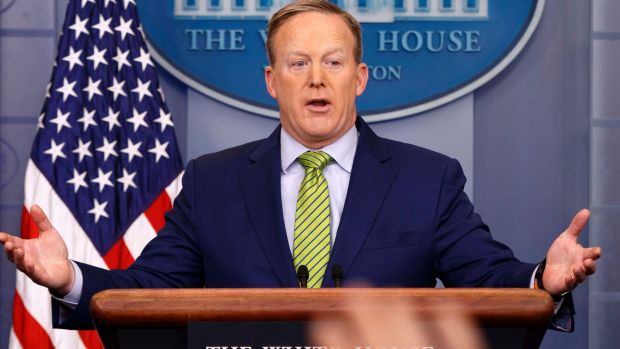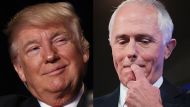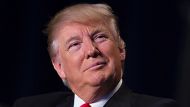Following a day of embarrassing revelations about US President Donald Trump's phone conversation with Prime Minister Malcolm Turnbull, the White House has said it will honour the refugee deal.
But in a further insult to Turnbull, White House press secretary Sean Spicer repeatedly mispronounced the Australian Prime Minister's name as "Trunbull".
More World News Videos
Our PM has a new name
Listen as White House press secretary Sean Spicer mispronounces Malcolm Turnbull's name, leaving it to a colleague to get it right.
Australian ambassador to Washington, Joe Hockey, met with White House chief of staff Reince Priebus and strategist Steve Bannon on Friday morning Australian time as Trump later echoed the promise that the deal would proceed, saying that if the "previous administration does something you have to respect that".
Asked at a White House briefing on Thursday afternoon whether the deal was indeed going ahead, Spicer said the widely reported conversation between the world leaders had been "cordial", and said the refugee deal would go ahead on the condition of "extreme vetting".
"The President is unbelievably disappointed in the previous administration's deal that was made and how poorly it was crafted and the threat to national security that it put the United States on," he said.
"He has tremendous respect for the Prime Minister and the Australian people, and has agreed to continue to review that deal and to ensure that, as part of the deal, which was always part of it, we would go through a very, very extreme vetting process to ensure that every single person that is being offered is coming here with peaceful intentions and poses no threat to the United States."
Spicer appeared to twice mispronounce Turnbull's name during the press conference, calling him "Mr Trunbull" or "Mr Trumbull".
Shortly after, Trump defended the phone call again in off-the-cuff remarks during an event in Washington, but said if the previous administration did something "you have to respect that" - seeming to concede he would honour the deal.

He said the deal involved "probably well over a thousand illegal immigrants who were in prisons and they were going to take them into this country and I said, 'Why?' Just wanted to ask the question ... 1250 [people], could be 2000, could be more than that.
"I said, 'Why, why are we doing this? What's the purpose?' So we'll see what happens.

"Previous administration does something - you have to respect that, but you can also [ask], 'Why are we doing this?' "
The dramatic events promoted assurances from leading Washington Republicans including former presidential candidate John McCain and House Speaker Paul Ryan.

Senator McCain described the President's treatment of Australia as "harmful".
"It was an unnecessary and frankly harmful open dispute over an issue which is not nearly as important as United States-Australian co-operation and working together, including training of our marines in Australia and other areas of military co-operation and intelligence," he said.
"I asked ambassador Hockey to convey to the people of Australia that their American brothers and sisters value our historic alliance, honour the sacrifice of the Australians who have served and are serving by our side, and remain committed to the safer, freer and better world that Australia does far more than its fair share to protect and promote."
Ryan downplayed the incident.
"I don't think Australia should be worried about its relationship with our new President or with our country for that matter," he said.
Republican Senator Lindsey Graham said the relationship remained strong, telling CNN he wished Trump "would sleep more and tweet less ... there's probably better ways to handle this".
Australian leaders continued to predict the deal would go ahead, despite the dramatic events.
Deputy Prime Minister Barnaby Joyce told Fairfax Media that Trump understood that deals agreed to between governments should not be broken.
"It is not a unilateral position that Australia has enforced on another country," he said.
"It is an agreed position between two countries and I think that is really important. People seem to think there is some unilateralism in this and there's not.
"There was an agreement between two countries over an issue and, in business and politics, when you have come to an agreement, that's it.
"You shake on it, that's a deal."
Defence Industry Minister Christopher Pyne said the deal was "fixed".
"Malcolm Turnbull stood up to him and the reality is Australia's interests are being put first," he told Channel Nine.
"Sure it's not a deal that Donald Trump would have done if he had been president at the time, and he obviously doesn't like the deal, but a deal is a deal."
Former ambassador to Washington Kim Beazley told ABC radio the US-Australian relationship was no longer "leader dependent".
"If you're going to pick on somebody who freeloads, you wouldn't pick on Australia," he said.
"He is having that pointed out to him ... in a way, no doubt, lessons are being learnt.
"As this administration goes on, it's going to have to learn that it operates in an alliance environment, even if it wants to make America first."
Former prime minister Kevin Rudd said the relationship was old enough to withstand a "snafu".
"I suppose the diplomacy of the rest of us has kind of got to get used to that," he said.
"If it's not, those refugees should be accommodated back in Australia as they should have been two or three years ago," he said.













480 comments
Comment are now closed